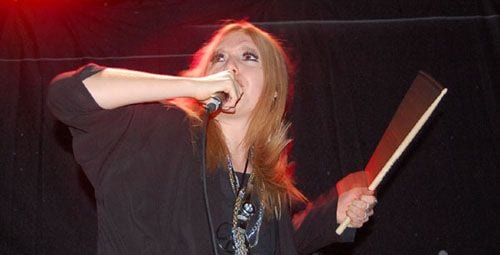
Swedish pop sensation Lykke Li is 22 years old, beautiful and puckish, which is not at all to be confused with callow or cute. A listen to her Bjorn Yttling-produced debut album, Youth Novels is an engrossing experience occasionally mired in too many gauzy passages, her voice amazingly gossamer but a little narcotic, too. If asked about what that means for a concert setting, it might lead you to expect a dreamy-eyed forest creature, hands cupped and mood placid, delivering appreciably pleasant but somewhat languid versions of what appears on the album.
But live, no: She’s a show of force, and during an hour of mesmerizing, artfully arranged originals and a few covers, she confirmed there’s plenty of teeth behind her tweeness — and piquancy, too. Clad in boots, a peace-sign-anchored charm necklace and a black get-up just this side of Stevie Nicks, she didn’t just dance, she raged — prowling her stage space like a feral cat, occasionally gesturing outward or bashing a nearby cymbal with a drumstick, stopping only to address the crowd with precocious confidence or soothe with a slower, more ethereal number.
If your lone measuring stick for live musical success is pure second-by-second corporeal excitement, however, Li’s support act, the Hertfordshire, UK-based trio Friendly Fires (amended to four members for their show), probably won the night. Their approach is a thumping collision of post-punk and dance-rock, studded with a frontman, Ed Macfarlane, who shimmies, shakes, pelvis-thrusts, rocks out, wails in bracing falsetto and careens ’round the stage as if stopping for a second would mean his expiration. LCD Soundsystem, Talking Heads, the Rapture, the Killers, Franz Ferdinand, and even Prince are all good bait for scribes that like to fish for references. Guitar noise was ragged and engulfing; the Fires’ axman sometimes played his for maximum sonic frippery with, no joke, a DustBuster. Keyboard samples were buoyant. Hand claps and driving percussion served to supplement already-overstated drums. The strobe light show was teed up. Hair was mussed. Oxford shirts were drenched in sweat. And that was just the band.
The combined effect of all this is to get the room pulsing; the lyrical content of songs like “Jump in the Pool”, the Michael Jackson-nodding “Lovesick”, and “Paris” is slight and sometimes generic and almost completely irrelevant. Yet, none of what they do feels vacuous; the band is so upbeat, exciting, and infectious that their moniker, if taken literally and not in its usual military parlance, is a perfect descriptor of what they do. The dance rock maxim holds: Substance can be minimal if you can connect warmth and vigor. Expect good things for these guys.
Li was a half-hour late hitting the stage and a CMJ showcase-saturated crowd was getting restless, clicking on BlackBerrys and iPhones, chattering with huffy frustration and maybe considering a bailout, especially with Friendly Fires having blown the room with nearly an hour of hyper-speed, sugar-rush dance rock. But when the lights went down and three bandmates emerged — a versatile corps comprising synths/keyboard/effects, bass/guitar and drums/percussion — she bent everyone to her will, exploring the portentous mood and deliberate pacing of “Melodies & Desires”, also Novels opening number, until she was sure the crowd was in her hands. Every selection after that was a more mutated version of its album form: Drums more stentorian, melodies more pointed, moods more enveloping. A three-pack of cover selections — Vampire Weekend’s “Cape Cod Kwassa Kwassa” (fun), Wendy Rene’s “After Laughter” (stellar, and surprisingly right in her wheelhouse) and A Tribe Called Quest’s “Can I Kick It?” (gimmicky) — rounded the set.
Read enough about Lykke Li in the music and entertainment press and you come away even more confused (and we’re not doing any more to un-muddy those waters, we realize). But there’s one thing everyone can agree on: She has a hugely charismatic stage presence and she knows it. At the Bowery Ballroom, it was a while before she directly addressed the audience with more than just basic salutations, and when she did, it was a mix of aww-shucks cuteness (“I am a debut artist, I have ten songs, so I have to do a cover now, OK?”) and spunky crowd control (telling the assembled they were too quiet, or “Are you depressed?” but that she would play a depressing number and it’s “OK to cry if you want.”) It played right into her persona of the mysterious pop starlet; warm and playful enough to be accessible, but cool and calculated enough that if you were to put your arm around her she might smile up at you or ram that drumstick through your heart and chuckle about it. Either way, she’s transfixing; being at the Bowery felt like seeing a major new talent during her ascent.

![Call for Papers: All Things Reconsidered [MUSIC] May-August 2024](https://www.popmatters.com/wp-content/uploads/2024/04/all-things-reconsidered-call-music-may-2024-720x380.jpg)



